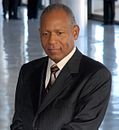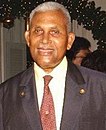1995 Trinidad and Tobago general election
| |||||||||||||||||||||||||||||||||||||||||||||
All 36 seats in the House of Representatives 19 seats needed for a majority | |||||||||||||||||||||||||||||||||||||||||||||
|---|---|---|---|---|---|---|---|---|---|---|---|---|---|---|---|---|---|---|---|---|---|---|---|---|---|---|---|---|---|---|---|---|---|---|---|---|---|---|---|---|---|---|---|---|---|
| Turnout | 63.3 ( | ||||||||||||||||||||||||||||||||||||||||||||
| |||||||||||||||||||||||||||||||||||||||||||||
| |||||||||||||||||||||||||||||||||||||||||||||
Early general elections were held in Trinidad and Tobago on 6 November 1995,[1] after the ruling People's National Movement had seen its majority reduced to a single seat due to a defection and a lost by-election.[2] The results saw the PNM and the United National Congress both won 17 seats. Although they had received fewer votes, the UNC was able to form a coalition with the two-seat National Alliance for Reconstruction, allowing UNC leader Basdeo Panday to become the country's first Prime Minister of Indian descent.[3] Voter turnout was 63.3%.[2]
Results[]
| Party | Votes | % | Seats | +/– | |
|---|---|---|---|---|---|
| People's National Movement | 256,159 | 48.76 | 17 | –4 | |
| United National Congress | 240,372 | 45.76 | 17 | +4 | |
| National Alliance for Reconstruction | 24,983 | 4.76 | 2 | 0 | |
| Movement for Unity and Progress | 2,123 | 0.40 | 0 | New | |
| Natural Law Party | 1,590 | 0.30 | 0 | New | |
| National Transformation Party | 83 | 0.02 | 0 | New | |
| People's Voice Party | 16 | 0.00 | 0 | New | |
| Total | 525,326 | 100.00 | 36 | 0 | |
| Valid votes | 525,326 | 99.06 | |||
| Invalid/blank votes | 4,985 | 0.94 | |||
| Total votes | 530,311 | 100.00 | |||
| Registered voters/turnout | 837,741 | 63.30 | |||
| Source: Nohlen | |||||
References[]
- ^ Dieter Nohlen (2005) Elections in the Americas: A data handbook, Volume I, p635 ISBN 978-0-19-928357-6
- ^ a b Nohlen, p641
- ^ Nohlen, p631
Categories:
- 1995 elections in the Caribbean
- Elections in Trinidad and Tobago
- 1995 in Trinidad and Tobago


